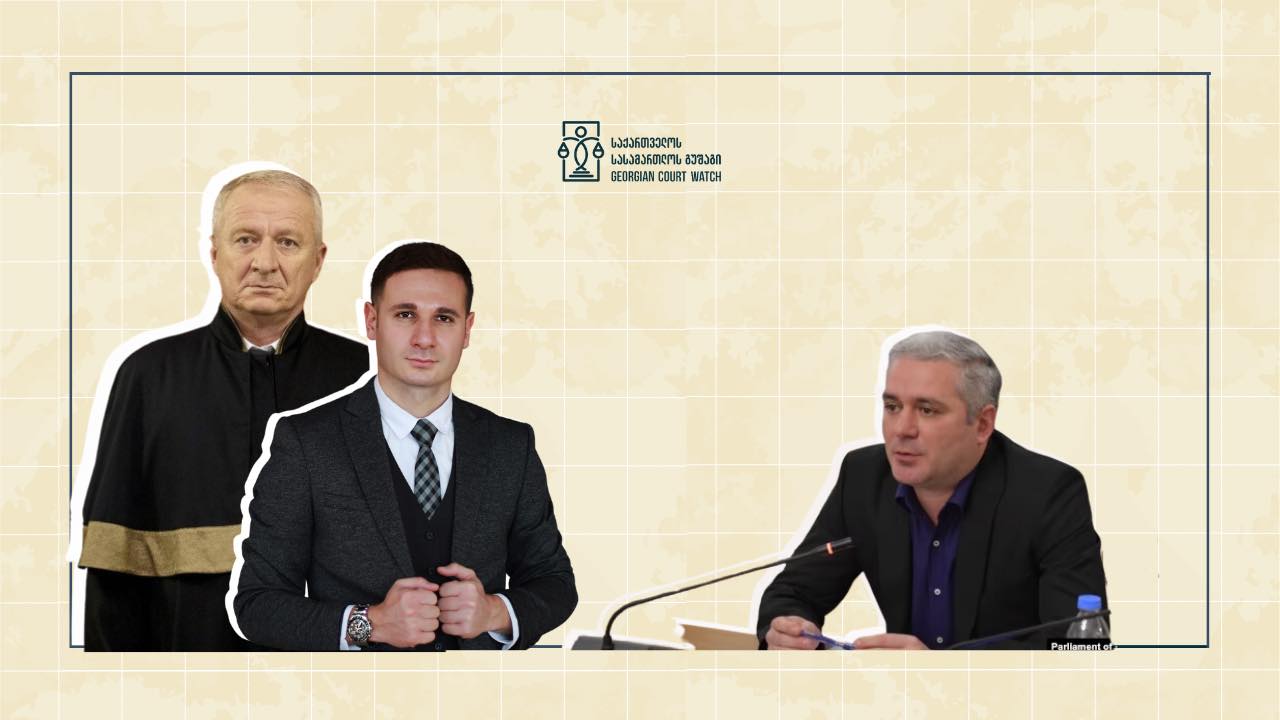The Illusion of Fulfilling the Requirement - the High Council of Justice Has Been Fully Staffed
Table of contents

Election of the non-judge members of the High Council of Justice was one of the conditions for obtaining EU candidate status. Despite the fact that the Georgian Parliament selected 5 non-judge candidates in total, none of them are candidates nominated by those civil society organizations, which had been working on judicial topics for years. Accordingly, with this decision, the government creates the illusion of fulfilling the requirement and they have not actually selected candidates with clearly defined visions, which may have become one of the preconditions of selecting them for the position.
On 17th of May 2023, the Parliament of Georgia elected 3 non-judge members of the High Council of Justice.
Opposition MPs also took part in making this decision, and they were talking about certain “formulas” regarding the selection process. Their clarification on why they supported Zurab Guraspashvili, Tristan Benashvili and Giorgi Gzobava was interesting.
- Nato Chkheidze was among those who supported election of three non-judge members. As she explained, “probably, Georgian Dream decided to fulfil some kind of promise, and Nishnianidze was one of the candidates in the list progressing to the second stage. It seems, formula 4/1 was on.” By this, Nato Chkheidze meant that in case of election of 4 members preferred by the government out of five non-judge members, the government would also support election of one candidate preferred by the opposition.
- Nika Machutadze stated that “the formula was 3/2, as well as 4/1, which, by the way, was the most relevant. Additionally, solving this topic by consensus was discussed under the 12 points of the European recommendations.”
- Bachuki Kardava hopes that among those people he had voted for “are not Georgian Dream candidates.” He also noted that he planned to vote for the people, who did not register for the poll at all, but were in the list.
After electing three members, part of the opposition left the Parliament session hall and the voting process did not continue.
It is worth mentioning that the non-judge members elected on 17th of May have not yet expressed dissenting opinion oh the High Councill of Justice meetings.
On 17th of October 2023, on a Parliament plenary session, the Parliament of Georgia elected two new non-judge members, however, Nino Nishnianidze, opposition-preferred candidate was not among them.
On the session, the MPs voted for four HCoJ non-judge membership candidates. The results were following:
- Rusudan Kvinikadze – 12 for, 2 against
- Goga Kikilashvili – 90 for, 0 against
- Levan Nemsadze – 90 for, 0 against
- Nino Nishnianidze – 15 for, 0 against
Making a decision on the election of the High Council of Justice requires 90 votes. therefore, election of Levan Nemsadze and Goga Kikilashvili as the non-judge members of the High Council of Justice became possible with the support of couple of opposition MPs.
The Georgian Court Watch studied the biography and some other information on the two newly elected members of the HCoJ.
Goga Kikilashvili
Goga Kikilashvili is a son of Khvicha Kikilashvili, active judge of the Constitutional Court of Georgia.
It is interesting that on 18th of May 2023, the Parliament refused to elect Goga Kikilashvili as a non-judge member of the High Council of Justice. However, in just 5 months, 90 MPs supported his candidacy. It is interesting, what has changes in 5 month that radically changed attitudes of the MPs. Most probably, we shall seek the answer in the Constitutional Court decision on the presidential impeachment. Khvicha Kikilashvili, father on now already a non-judge member of the HCoJ, is one of those judges who found the violation of the constitution by the president.
The Parliament listened to Goga Kikilashvili as a candidate on 12th of December 2022. He talked about the topics, such as mechanisms for disciplinary liabilities, alternative ways of court dispute resolution (mediation), and its development, as well as low reputation of judiciary and lack of public trust toward it, etc. It is interesting that Goga Kikilashvili named the lack of public awareness as the reason for the low reputation of the court in society: “the second challenge in regards with judiciary, reputation risks, is mostly the result of insufficient public awareness”[…].” He positively evaluated the rule of staffing the High Council of Justice, taking into account that nowadays, the majority of the Council is elected by the Self-governing body of court judges.
Listen to the full audio recording of the interview with Goga Kikilashvili.
On 7th of May 2009, in the comment to media holding Week, Goga Kikilashvili assessed the case of Sandro Girgvliani:
“When discussing the Supreme Court, we shall mention that the Supreme court did not have any leverage for a different result” on Girgvliani case... As for Levan Murusidze – the problem of personification is relevant to all topics under public discussion. It is the same in this case. The resonant topic was automatically affiliated with one specific person – Levan Murusidze, meaning that the civil society in Georgia is not at the level of having relevant legal knowledge to correctly evaluate the processes. Therefore, such topics are easily tied to a specific subject”.
Khvicha Kikilashvili’s career before Constitutional court:
It is noteworthy that election of Goga Kikilashvili’s father, Khvicha Kikilashvili as a judge of Constitutional court by the judicial plenum was part of the vague process. Non-governmental organizations actively called for the Supreme court to refrain from electing the Constitutional court judge in the state of emergency. Khvicha Kikilashvili’s work experience before appointment as a judge of Constitutional court, goes back to the Prosecutor’s Office and General Courts. In more detail:
- In 1994-1995 worked as an investigator in Poti Regional Military Prosecutor's Office.
- In 1995-1998 was an investigator in Telavi Regional Military Prosecutor's Office.
- In 1998-2002was an assistant prosecutor in Telavi Regional Military Prosecutor's Office.
- In 2002-2004 became a deputy prosecutor in Telavi Regional Military Prosecutor's Office.
- In 2004-2006 was a senior investigator of the investigative department of Kakheti District Prosecutor's Office.
- In 2006 was a judge in Sighnaghi District Court (Court Chairman).
- In 2011-2013 was a judge in Khelvachauri District Court.
- In 2013-2016 was a judge in Batumi City Court.
- In 2016-2019 was a judge in Khelvachauri District Court (Court Chairman).
- In 2019-2020 was a judge in the Criminal Chamber of Tbilisi Court of Appeals.
- On 3rd of April 2020, with the statement №3/pl of Georgian Supreme Court Plenum, was appointed as a member of the Constitutional Court of Georgia.On 8th of April, same year, from the day of taking the oath, he began to exercise his authority as a judge.
Additional information on Goga Kikilashvili:
The candidate was nominated by the International Black Sea University. Goga Kikilashvili graduated from law at Ivane Javakhishvili Tbilisi State University. He is a Doctor of Law.
Work experience: Before being elected as a member of the High Council of Justice,on 7th of February 2018, the HCoJ elected him as an independent member of the High School of Justice. On 18th of October 2023, the High Council of Justice decided to terminate independence membershio of the High School of Justice for him.
Additionally, since 2015, he is a lecturer at various state and private universities, and the director of “Kikilashvili and Company” law firm. He is also a mediator for collective labor disputes and attorney with general specialization.
Property of Khvicha and Goga Kikilashvili:
According to the declaration submitted by Khvicha Kikilashvili and describing data for 2022, only two real estate properties are under the judge’s name – a land plot and a house in Dedoplistskaro purchased in 2008. Biggest part of the property is registered under the name on Ia Batsatsishvili, the judge’s spouse. Ia Batsatsishvili owns 2 ancestral land plots and a house in Dedoplistskaro. Apart from this, she also owns two apartments and 1 garage in Tbilisi and 1 apartment in Batumi. According to information given, at different periods, Khvicha Kikilashvili and Ia Batsatsishvili spent 25 900 USD and 119,681 Gel total.
As for the incomes and expenses of the judge and his family, according to the property declaration, income source for the whole family is the judge’s remuneration. In 2022, Khvicha Kikilashvili, as a judge of the Constitutional Court, received 118,546 Gel as the total remuneration. The same year, expenses, covering renovation works and loan payments amounted to 61,046 Gel.
According to the Anti-Corruption Law of Georgia, “family members” of a person are a spouse, children and step-children under 18 and a person permanently living with them. In the block for family members of the property declaration, apart from the spouse, Khvicha Kikilashvili had been indicating Goga Kikilashvili for year, but since 2017, there is no record on Giga Kikilashvili, which according to the law, means that Goga Kikilashvili does not live with the parent anymore.
As for Goga Kikilashvili’s property according to public registry records, currently Goga Kikilashvili has two land plots (property 1; property 2) in Dedoplistskaro, which were gifted to him, and 1 purchased land plot located in the village of Arboshiki, Dedoplistskaro.
According to the latest data, Goga Kikilashvili was a director of the LEPL Education and Innovation Centre; he is also a member of executive board of Swedish Students’ Alumni Network. Apart from non-entrepreneurial activities, Goga Kikilashvili is a founder and 100% shareholder of Ltd “Kikilashvili and Company”, which he founded in 2019. According to the regulation, company’s activities include: advocacy and expert services, mediation, arbitration and professional legal education.
Levan Nemsadze
It is relevant to mention in this case too that on 17th of May 2023, the Parliament refused to elect Levan Nemsadze as a non-judge member of the High Council of Justice. On 17th of October, initially, 89 votes were registered supporting the election of Levan Nemsadze as a member of the High Council of Justice. As it was explained later, electronic voting device of one of the MPs was out of order. Voting was held again and 90 members of the parliament supported Levan Nemsadze's candidacy.
Committee hearing of Levan Nemsadze
- “I think both judges and judicial system is independent.”
- Natadze explained challenge of court overloading as follows: “we are again facing judicial independence and impartiality, otherwise, if [people] do not have trust in the court, they will not file a suit… when a citizen files a dispute, they must think whether it is worth doing so in terms of timelines. It is an obstacle [on the part of] the citizen, not how legal and fair the decision will be in 20 courts, for example.”
- About the changes of 2021 to the Georgian Organic Law on General Courts: “I positively evaluate the changes on disciplinary proceedings.
- It is important that Nemsadze avoided the question related to the existence of corporatism and an influential group in the High Council of Justice.
Listen to the full audio recording of the interview with Levan Nemsadze.
Additional information on Levan Nemsadze
The candidate was nominated by the Association for Free Development and Protection of Rights and Society for Civil Development. The Parliament of Georgia elected Levan Nemsadze with 90 votes.
Levan Nemsadze graduated from the faculty of jurisprudence at Ivane Javakhishvili Tbilisi State University, with the diploma equal to Master’s.
- Since 2008 up to now, Levan Nemsadze works in the judicial system:
- In 2008-2009 was a court bailiff in Mtskheta District Court;
- In 2009-2011 was Head of bailiff service in Mtskheta District Court;
- In 2011-2012 was Head of the Sector of the Administrative Affairs Board of the Chancellery Department of Tbilisi City Court;
- In 2012-2013 worked as the Head of Administrative Affairs Bureau of Tbilisi City Court;
- In 2013-2015 was Chief specialist in the organizational issues of the Administrative Affairs Board of the legal and organizational assurance department at Tbilisi City Court;
- In 2015-2017 worked in the High Council of Justice as Head of the Quality Management and Reforms Division of the Department of International Cooperation and Quality Management;
- In 2017-2022 was the Head of Judicial Ethics Division on administrative cases of the Department of Judicial Ethics in the High Council of Justice of Georgia;
- In 2019-2020 was a member of the LEPL - Standing Commission reviewing issues of conditional sentence cancellation of the National Agency for the Execution of Non-custodial Sentences and Probation under the Georgian Ministry of Penitentiary and Probation;
- In 2022 was senior consultant of the Management Department Quality Group, under the labor agreement.
Thus, Levan Nemsadze only formally meets the legal requirements of the Council membership criteria, as being an employee of only a judicial system for years, he represents neither academic, nor civil society.
Election of the non-judge members of the High Council of Justice is one of the conditions for obtaining EU candidate status. The High Council of Justice of Georgia operated with incomplete composition for more than 2 years. The Parliament of Georgia should have elected 5 non-judge members within legal time limits but, finally fulfilled this liability on 17th of October by electing all five non-judge members. However, with this decision, the government only created an illusion of fulfilling the requirement.
-----
Materials published on Courtwatch.ge is a property of Georgian Court Watch and, when using them, “Georgian Court Watch” shall be indicated as a source.

Parliament cannot elect non-judge members of the Supreme Council of Justice - "Will this process lead us to the European Union?"

What do we know about the new non-judge members of the High Council of Justice?

Statement on electing non-judge members of the High Council of Justice































